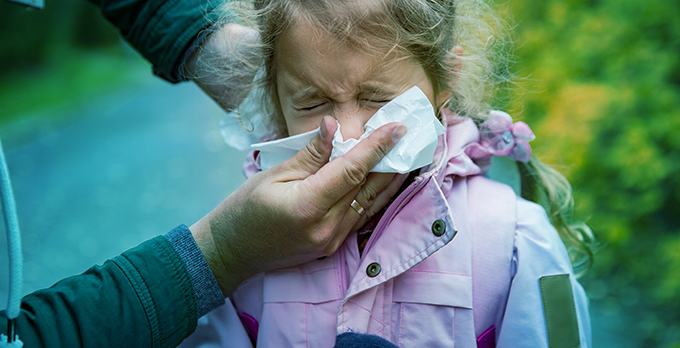Back-to-school is in full swing! It’s an exciting time for families, but it’s also typically the time of year when young kids start getting sick. That means extra stress for parents. While taking care of kiddos should be a priority, experts at The University of New Mexico Health Sciences say it’s just as important for parents to remember to take care of themselves.
Kids get sick a Lot, but it’s normal
On average, children can get sick more than eight times a year, sometimes back-to-back, and those sick periods can last anywhere from three to ten days.
“If you think about it, that is probably most of their young life, or at least it feels like that to parents,” says Anna Duran, MD.
Duran is the chief medical officer at UNM Children’s Hospital. She says she knows it can be overwhelming for parents when their children are sick.

I always tell parents, ‘we can't keep our children in a bubble, and viruses are all around us.’ While it can be challenging for parents when their children are sick, it's important to remember that each exposure to a virus builds their immune system by generating antibodies against those viruses.
But Duran says the good news is that as children get older, symptoms become less severe, and they get sick less often.
Click on Video Below for Tips from Dr. Duran for Parents With Sick Kids
View this post on Instagram
Sick Kids Need Well Parents
No doubt about it, having a sick kid on top of everyday stressors can be a lot for parents to manage. Kristina Sowar, MD, is an associate professor in the UNM School of Medicine’s Department of Psychiatry.
“It’s hard,” she says. “Especially those long streaks when parents want to know ‘when are they going to get better? Are they okay?’”
Setting Expectations
To avoid feeling overwhelmed, Sowar says it starts with parents setting realistic expectations.
“It’s important to have the expectation that, the kiddo is going to get sick. That this happens, not infrequently, and it’s a process,” she says. “And also, to remember after a kid has been in school for a few years, often their immunity is stronger, so the process gets easier.”
Sowar suggests planning for backup care when a child is sick, whether that’s parents taking turns caring for the child to lighten the load or seeking the help of a babysitter or another family member, if possible.
Avoiding Burnout
The danger of parents trying to do it all is burnout. Sowar says when parents are in the mode to go, go, go they become disconnected to how they are feeling themselves and that can have a domino effect.

In those high-pressure moments, we're not always connected with what our own stress levels are. In turn, we may be short-fused and not be resourced enough when our kiddo needs more support, or when we need to have more compassion, whether it's for ourselves or for other people. In those moments we're often not attuned physically to how we're feeling.
Slow Down and Take Breaks (long and short)
Sowar says it’s critical parents find ways to slow down and lighten their load.
“Sometimes it's finding that space within ourselves to be like, ‘it's okay to slow down, it's okay to take sick days, it's okay to use paper plates for dinner, or order in,’” she says.
Breaks are hugely important to avoid burnout and Sowar says those breaks can be both long and short. For example, if a parent recognizes they are headed towards a heated or stressful interaction with their kid, that’s a good time to step away.
“It's important for parents to carve out space,” she says. “Take a minute. As long as your kids are in a safe space, just step out, do some deep breathing, put on some music.”
Sowar says even small breaks can make a big difference.
“When we have this high stress, our sympathetic nervous system is really on high-drive. So, anything that we can do, even if it's just a minute or two of breathing or mindfulness helps brings us down where our parasympathetic nervous system is kicking in. That's really helpful in terms of our overall body stress balance,” she says.
But you can’t rely solely on what Sowar calls microbreaks. It’s important to take bigger breaks for things throughout the week like exercising or going out with friends.
“Do the things that help you feel connected with who you are beyond the day-to-day parenting,” she says. “There's good evidence that that's helpful.”
At the end of the day, the way parents take care of themselves is also an important lesson for their kids.
“We set a model for our kids,” Sowar says. “If we are really focused on being busy, our kids see that and pick up on that, so modeling self-care is valuable for them as well.”
